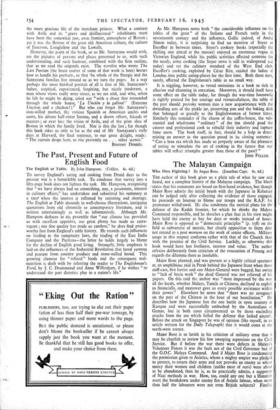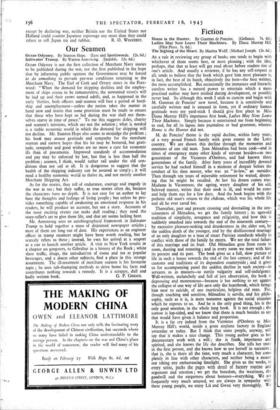The Malayan Campaign
Who Dies Fighting ? By Angus Rose. (Jonathan Cape. 8s. 6d.) THE author of this book gives us a plain tale of what he saw and, heard, not a complete history of the Malayan campaign. The blurb states that his comments are based on first-hand evidence, but though Major Rose admits the initial brush with the Japanese in Kelantan can be judged only after collecting the evidence of those engaged, he proceeds on hearsay to blame our troops and the R.A.F. for premature withdrawal. He also condemns the tactical plans for the defence of the Kedah frontier, for which he thinks the Malaya Command responsible, and he sketches a plan that in his view might have held the enemy at bay for days or weeks instead of hours. Major Rose is opposed to " democratic principles " (p. 158) on the field as subversive of morale, but clearly opposition to them does not extend to a post mortem on the work of senior officers. Military usage in this respect conforms rather with that of the Church than with the practice of the Civil Service. Luckily, as otherwise this book would have lost liveliness, interest and -value. The author refrains deliberately from criticism of the evacuation of Penang and regards the dilemma there as insoluble.
Major Rose planned, and was present as a highly critical spectator at, an amphibious raid in Perak behind the Japanese front when three staff-cars, five lorries and one Major-General were bagged, but owing to " lack of brain work " the dead General was not relieved of his papers. Op this raid the author was "most impressed by the way all the locals, whether Malays, Tamils or Chinese, declined to exploit us financially, and moreover gave us every possible assistance within their power." Elsewhere he notes that " there was no arrogance on the part of the Chinese in the hour of our humiliation." He describes how the Japanese lost the one battle in open country at Kampar and were successfully ambushed by the Australians at Gemas, but in both cases circumvented us by those encircling attacks from the sea which foiled the defence that lacked aircraft. Before the attack on Singapore he was of opinion (like myself, in an article written for the Daily Telegraph) that it would come at the north-west corner.
Major Rose is so lavish in his criticism of military error that it may be churlish to review his few sweeping aspersions on the Civil Service. But if before the war there were defects in Malaya's Volunteer Forces it was the fault not of the Civil Governor but, of the G.O.C. Malaya Command And if Major Rose is condemning the permission given to Asiatics, whom a mighty empire was pledged to protect, to return their arms and not provoke an enemy to whose mercy their women and children (unlike most of ours) were about to be abandoned, then he is, as he practically admits, a supporter of Nazi methods in war. How, too, could any one but a Himmler avert the breakdown under enemy fire of Asiatic labour, when more than half the labourers were not even British subjects? Finally,
except by declaring war, neither Britain nor the United States nor Holland could counter Japanese espionage any more than they could
refuse to sell Japan tin and rubber. R. 0. WDJSTEDT.



























 Previous page
Previous page